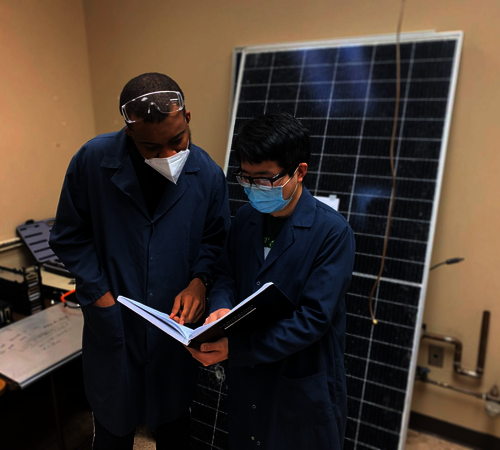Knowing that battery storage is significant to the future of renewable energy, the University of Kentucky, Louisville Gas and Electric Company and Kentucky Utilities Company (LG&E and KU) have partnered to develop methods for recovering valuable materials from solar panels and lithium-ion batteries, thus reducing future costs and further improving the environment.
The joint team, co-located at the KU building in downtown Lexington, is also working on a series of sustainability projects, including solar data analytics, energy storage, renewable energy integration, carbon capture technology and hydrogen production. These joint research projects with UK support the commitments made by LG&E, KU and its parent company PPL Corporation to achieve net-zero carbon emissions by 2050, with interim emissions reductions targets of 70% by 2035 and 80% by 2040.
A Method to Recover Silver from End-of-Life Solar Panels
According to the National Renewable Energy Laboratory (NREL), there will be an estimated one million tons of decommissioned solar panels in the United States by 2030.
“Managing decommissioned solar panels is becoming increasingly urgent,” said Kunlei Liu, associate professor in the UK College of Engineering. “These decommissioned solar panels not only contain silver, a precious metal, but they also contain cadmium and lead, which are both heavy metals.”
To prevent these elements from ever reaching a landfill, the joint team is developing a novel electrochemical method to recover silver and heavy metals such as lead and cadmium from decommissioned solar panels. This method is cost effective and uses less strong acid than traditional recovery methods.
The current focus is on decreasing the treatment time and improving the silver recovery rate. In addition, the recovered silver can be used to produce new solar panels.
Recovering Valuable Materials from End-of-Life Lithium-Ion Batteries
The team is also developing a new method of battery recycling to recover materials — including the expensive elements of nickel, lithium, and cobalt — from used lithium-ion batteries.
Lithium and cobalt mining are labor and environmentally intensive processes, making their recovery at the end of the battery’s useful life crucial for sustainability. Currently, when batteries reach the end of their useful life they are placed in landfills or recycled using strong acids.
The method developed by the team is more environmentally friendly as it does not require strong acids and uses hydrogen, water and heat to achieve separation. In addition, the extracted nickel, lithium and cobalt can be used to manufacture new lithium-ion batteries. This research is focused on increasing the metal recovery rate and developing the process for large-scale implementation.

